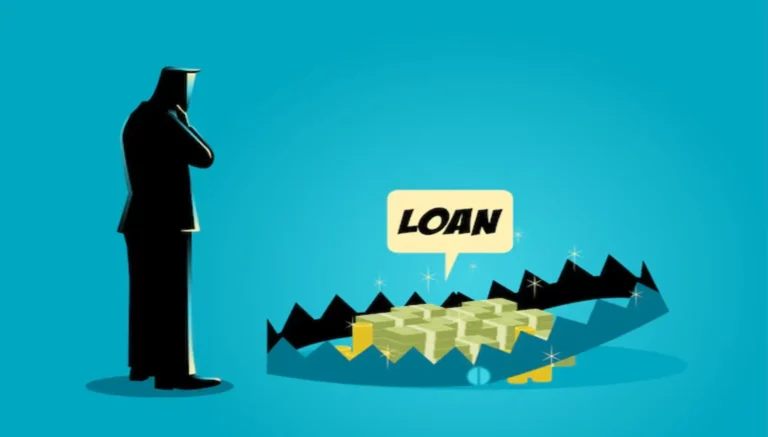
The convenience and accessibility of loan apps have led to their increasing popularity among individuals seeking quick financial assistance. With just a few clicks on a smartphone, borrowers can apply for loans, receive an approval within minutes, and have funds transferred directly to their accounts. This convenience has made loan apps a go-to solution for individuals facing urgent financial situations, avoiding the bureaucracy associated with traditional lending institutions. However, the question that often arises is: Can loan apps take legal action against borrowers who default on their payments? In this article, we’ll dig into this topic, and examine the details.
How do Loan Apps Work?
Loan apps, also known as digital lending platforms, are innovative financial tools designed to provide quick and convenient access to funds. These apps operate primarily through mobile devices. This enables users to borrow money without the extensive paperwork and time-consuming processes associated with traditional lenders. With technology and data analytics, loan apps aim to simplify borrowing and cater to individuals who require emergency financial assistance.
Loan apps typically partner with financial institutions or investors who provide the funds for lending. The apps themselves serve as intermediaries, facilitating the application, approval, and disbursement of loans. This digital approach allows for faster credit assessments, enabling borrowers to receive decisions within minutes. The borrower’s creditworthiness is often evaluated based on a combination of factors, including credit history, income sources, and other relevant data points.
How to Apply for a Loan
The borrowing process through loan apps is created to be user-friendly and efficient. Below is a step-by-step breakdown of how it generally works.
- Application: Borrowers download the loan app and complete a simple application form. In the form, personal and financial information would be provided.
- Submission: Once the application is submitted, the app’s algorithms swiftly analyze the data to determine the borrower’s creditworthiness and risk profile.
- Approval: If approved, borrowers receive loan offers outlining the terms, interest rates, and repayment schedules.
- Acceptance: Borrowers review the terms and conditions of the loan offers. Upon agreement, they confirm their acceptance digitally.
- Disbursement: After acceptance, funds are disbursed directly to the borrower’s linked bank account, often within hours or even minutes.
What is Loan Default?
Loan default occurs when a borrower fails to make the agreed repayments within the specified timeframe as outlined in the loan agreement. This failure to meet the contract can result in a series of financial and legal consequences. This can significantly impact the borrower’s financial stability.
When a borrower defaults on a loan obtained through a loan app, it signifies a breach of the loan agreement. This breach can lead to various negative outcomes. It includes damage to the borrower’s credit score, accumulation of additional interest and fees, and the initiation of legal actions by the loan app.
Actions Taken by Loan Apps in Case of Default
Loan apps have several options when borrowers default on their loans. These actions can vary based on the terms of the loan agreement and the legal framework of the jurisdiction. Common actions include:
- Collection Attempts: Loan apps often make attempts to contact defaulting borrowers to remind them of their outstanding debt and encourage repayment.
- Reporting to Credit Bureaus: Defaulted payments are usually reported to credit bureaus, which can significantly lower the borrower’s credit score and affect their ability to secure credit in the future.
- Interest and Fees: Additional interest and late fees can accrue on the outstanding debt, increasing the overall amount owed.
- Debt Collection Agencies: Loan apps may engage third-party debt collection agencies to recover the outstanding debt. These agencies can be persistent in their attempts to collect the debt.
- Legal Action: In cases of prolonged default, loan apps may opt for legal action, such as filing a lawsuit to obtain a court judgment. This judgment can lead to wage garnishment, property seizure, or other measures to recover the debt.
Terms and Conditions
Amid the speed and convenience of borrowing through loan apps, it’s paramount for borrowers to carefully read and comprehend the terms and conditions associated with the loan. These terms outline the borrower’s obligations, the repayment structure, interest rates, fees, and any potential consequences of default. These terms serve as the foundation for any legal recourse the app may take. Therefore, borrowers are advised to carefully read and comprehend these terms before availing of a loan. Failing to fulfill the repayment obligations outlined in the terms and conditions can provide loan apps with the grounds to initiate legal proceedings. In many countries, loan apps operate under the same legal framework as traditional lenders.
Borrower’s Rights and Responsibilities
Borrowers engaging with loan apps are entitled to specific rights under consumer protection laws. These regulations are designed to ensure fairness, transparency, and responsible lending practices within the financial industry.
Rights
- Full Disclosure: Lenders, including loan apps, are obligated to provide clear and complete information about loan terms, interest rates, fees, and repayment schedules. This empowers borrowers to make informed decisions.
- Non-Discrimination: Borrowers have the right to be treated fairly and without discrimination during the lending process, irrespective of their gender, race, religion, or other protected characteristics.
- Right to Rescind: Some regions offer a “cooling-off period” during which borrowers can cancel the loan agreement without penalty, typically within a specified timeframe after receiving funds.
- Fair Collection Practices: Lenders must adhere to fair debt collection practices and refrain from engaging in abusive, harassing, or misleading tactics.
Before accepting a loan offer, borrowers should:
- Thoroughly review the terms and conditions, seeking clarification on any ambiguous points.
- Inquire about potential fees, penalties, and consequences of default.
- Understand the process for requesting modifications to the repayment plan if needed.
Responsibilities
- Timely Repayments: Borrowers must make their loan repayments on or before the due date. This ensures a consistent repayment history and reflects positively on their credit report.
- Notification of Financial Difficulties: If facing financial challenges, borrowers should promptly communicate with the lender. Some loan apps might offer assistance or modified repayment plans for those experiencing temporary financial hardships.
- Accurate Information: Borrowers must provide accurate and truthful information during the loan application process. Misrepresentation can lead to loan denial or other unfavorable outcomes.
Common collection methods of Loan Apps
Loan apps often resort to various collection tactics when borrowers default on their loans. While some practices are ethical and within legal boundaries, others might raise concerns.
- Reminder Notifications: Loan apps may send automated reminders via email, SMS, or app notifications to prompt borrowers to make repayments.
- Contact Attempts: Lenders might try to reach out to borrowers via phone calls to discuss overdue payments and discuss potential solutions.
- Debt Repayment Plans: Some loan apps may offer borrowers the option to establish modified repayment plans. It could include a plan that accommodates their financial situation.
- Engaging Debt Collection Agencies: Loan apps might enlist third-party debt collection agencies to pursue overdue payments on their behalf.
- Credit Reporting: Defaulted payments can be reported to credit bureaus, impacting the borrower’s credit score and future borrowing opportunities.
Ethical and Legal Boundaries in Debt Collection
While lenders, including loan apps, have the right to pursue repayment, there are ethical and legal boundaries that must be respected. It’s essential for collection efforts to adhere to the principles listed below.
- Fairness: Collection practices should be fair and respectful, without employing intimidation, harassment, or invasive methods to pressure borrowers.
- Transparency: Borrowers should be informed about their rights, the debt collection process, and the potential consequences of non-payment.
- Privacy: Lenders must handle borrowers’ personal and financial information confidentially, in compliance with data protection regulations.
- Truthfulness: All communication from lenders should be accurate and not involve misleading or deceptive statements.
When can Loan Apps take Legal Action?
Loan apps may pursue legal action as a last resort when borrowers repeatedly default on their loans and fail to engage in communication or make repayment arrangements. Instances, where legal action might be taken include:
- Long Default: If a borrower remains in default for a long period despite attempts at communication, the lender might resort to legal action to recover the outstanding debt.
- Unresponsive Borrowers: When borrowers fail to respond to notifications, requests for communication, or debt repayment options, lenders might seek legal remedies.
- Breach of Loan Agreement: Borrowers who breach the terms of the loan agreement, such as failing to repay according to the specified schedule, may face legal consequences.
How to Avoid Legal Issues with Loan Apps
Borrowers can take proactive steps to steer clear of situations that could lead to legal action by loan apps. Below are some tips to consider.
- Read and Understand Terms: Thoroughly review and comprehend the terms and conditions of the loan agreement before accepting any offers. Awareness of your responsibilities helps prevent misunderstandings.
- Borrow Responsibly: Borrow only what you can comfortably repay within the specified timeframe. Overextending yourself financially increases the risk of default.
- Plan for Repayment: Create a budget that accounts for loan repayments and stick to it. This ensures you allocate funds for loan obligations alongside other financial commitments.
- Be Organized: Keep records of communication with the loan app, including payment receipts and any agreements reached. This documentation can be useful in case of disputes.
- Prioritize Timely Repayments: Making repayments on time is important. Set reminders or automatic payments to avoid missed due dates.
Can a Defaulter be Jailed?
While a loan company does not have the authority to imprison individuals, not fulfilling loan obligations can lead to various consequences. Initially, the loan company will employ different methods to recover the unpaid amount. If these efforts prove ineffective, the company might take legal action by suing you in court.
Chiefly, the decision regarding imprisonment is in the hands of a judge. If legal proceedings lead to a determination of guilt, the judge will determine the appropriate course of action, which could potentially include imprisonment. Therefore, the question of whether non-payment of a loan could result in jail time is affirmative. It’s important to understand that legal action and its consequences are determined by a court of law.
Communication with Loan Providers
Open and transparent communication with loan providers is key to avoiding legal issues. If you encounter financial difficulties that may affect your ability to make repayments:
- Reach Out Early: If you foresee problems with repayment, contact the loan app as soon as possible. Don’t wait till the repayment date. They may offer solutions like modified repayment plans or temporary payment suspensions.
- Explain Your Situation: Communicate your situation no matter what it is. Lenders are often willing to work with borrowers who demonstrate a genuine commitment to resolving their debt.
- Follow-Up in Writing: After discussing potential solutions over the phone, follow up with a written contract that outlines the agreements reached. This provides a record of the arrangement.
The increase in the popularity of loan apps has undoubtedly changed lending from financial institutions. These apps provide borrowers with exceptional access to financial resources. However, borrowers must recognize that loan apps operate within legal frameworks that empower them to take action in cases of default.

